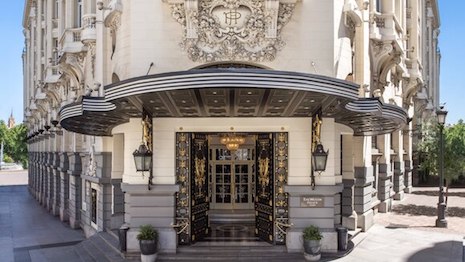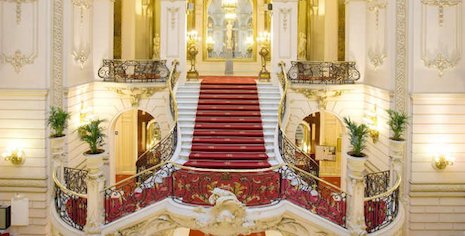 Exterior of the Westin Palace Madrid. Image credit: Marriott
Exterior of the Westin Palace Madrid. Image credit: Marriott
The Financial Times is bringing its Business of Luxury Summit to Madrid for the first time in the conference’s 15 years.
From May 19 to 21, delegates will gather in the Spanish capital at the Westin Palace Madrid hotel for discussions on how luxury is changing due to factors such as political forces and digitization. With the theme “Rethinking Luxury,” the event aims to provide an idea of where luxury is headed.
"Spain is a really interesting place to look at in terms of where the luxury market is developing," said Jo Ellison, fashion editor at the Financial Times and co-chair of the summit. "It’s one of the fastest growing economies in Europe and the luxury market is expected to more than double to 20 billion [euros] by 2025, which makes it smaller than France or Italy, but growing at twice the global rate."
Rethinking luxury
The conference will kick off with a welcome reception at the Museo Nacional del Prado on May 19, during which attendees will be able to take private tours of the museum.
Sessions start the next morning with an opening keynote by Sidney Toledano, chairman and CEO of the LVMH Fashion Group, who will be providing an overview of where the conglomerate is today. LVMH's fashion division has been undergoing a number of changes, including new creative directors such as Hedi Slimane at Celine and Maria Grazia Chiuri at Dior.
The company also just announced that it is partnering with Rihanna on a fashion label that is poised to shake up the existing relationship between celebrity and luxury (see story).
Also covering the current state of groups will be José Manuel Albesa, brands, markets and operations president at Puig, which counts Nina Ricci, Jean Paul Gaultier and Carolina Herrera among its portfolio.
Alexander McQueen’s CEO Emmanuel Gintzburger will be talking about the brand’s growth plan. Lately, its parent company Kering has been looking accelerate the label and turn it into a 1 billion-euro brand, following significant growth at Gucci and Saint Laurent.
One panel will cover the state of bricks-and-mortar, with speakers from Moda Operandi, Sephora and McArthurGlen discussing how the physical store is changing rather than dying.
Getting to the challenges facing the traditional models of business, sessions will also cover topics such as the changing media landscape, disruption in the diamond industry and diversity.
As consumers change how they are spending, a chat with American Express’ senior vice president and general manager, global merchant services Sujata Bhatia will uncover how purchases of luxury goods are evolving.
Other keynotes and conversations will feature Loewe’s creative director Jonathan Anderson, Sir Paul Smith, Moncler CEO/chairman Remo Ruffini and Loro Piana CEO Fabio d’Angelantonio.
In addition to the sessions, the FT has planned a networking evening after the first full day of the conference. On May 20, delegates will head to drinks and dinner at Casino de Madrid, which serves as both a private member club for elites and an event venue.
Casino de Madrid. Image credit: Madrid Tourism
"From my experience of hosting it, I just find it a really interesting conversation," Ms. Ellison said. "So I think many of the topics that come up are a reminder of what the market is doing at the moment and the truth of what our interests are…and then just to also pick up on the things that are in the back of your mind that you thought were probably relevant, but having a bit more clarity and also having different opinions on something.
"I just find it a really good forum for an open discussion, and I personally, and I hope the delegates just learn a lot from it," she said.
Luxury changes
The luxury business is not immune to disruptions, as emerging affluent consumers continue to embrace technology, social media and sustainability at rapid rates.
While luxury goods were once characterized by exclusivity, craftsmanship and heritage, the industry has become more democratized in the last decade. According to a new report from Coresight Research, the luxury business is not slowing down but it is shifting towards Asian consumers and away from the more established markets in Europe and the United States (see story).
Of the many disruptions to the overall luxury business, none are more directly important than the changing ways that luxury consumers shop.
At the Financial Times Business of Luxury Summit in 2018, a panel of executives from luxury retailers discussed the consumer behavior of today, particularly among millennials. Overwhelmingly, digital and social media factor heavily into modern consumers’ purchasing habits (see story).
"Luxury has had a fairly kind of – I wouldn’t say bad – but maybe a slightly more controversial reputation in recent years because it’s become so widespread and used by so many people," Ms. Ellison said. "And in terms of the business – digital revolution, ecommerce, social media, sustainability, global footprint – all these things have just really challenged how the luxury market functions, cooperates, sells, manufactures.
"So this is an opportunity to look at the big trends that are ongoing at the moment and then to look at what it means moving forward. But to speak to what it means right now, I still think it’s kind of hugely to do with the savoir faire of the craftsman that makes the individual item but it also in terms of the interpretation and the language that different brands are communicating with and how they’re communicating with their customers."
Please click here to register for the Financial Times Business of Luxury Summit
